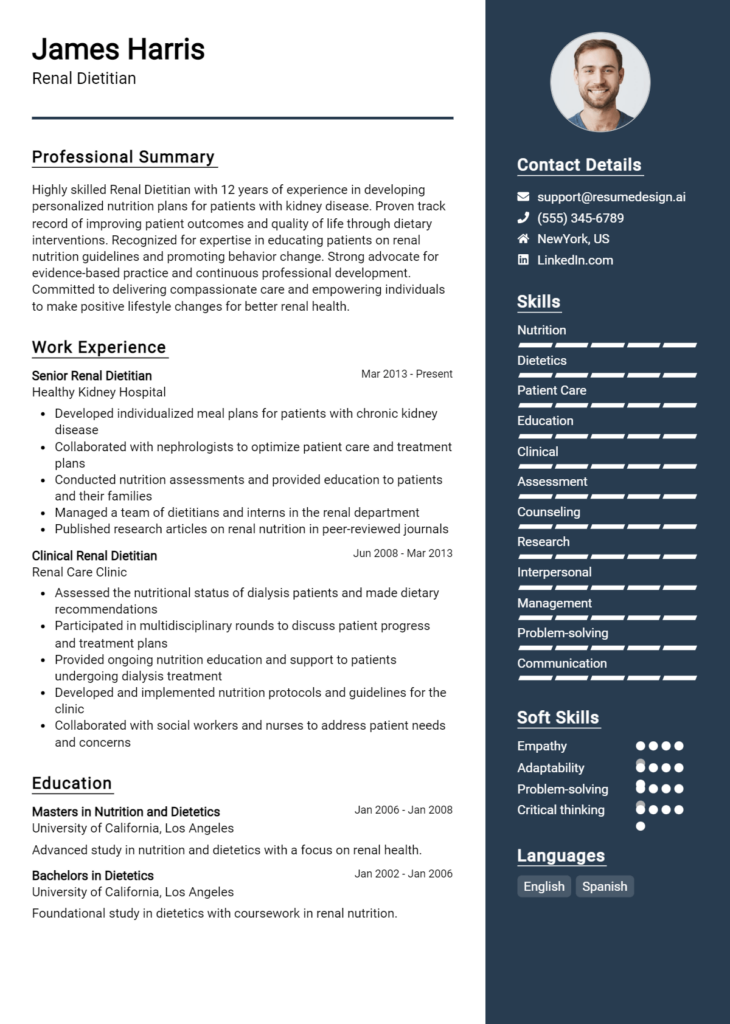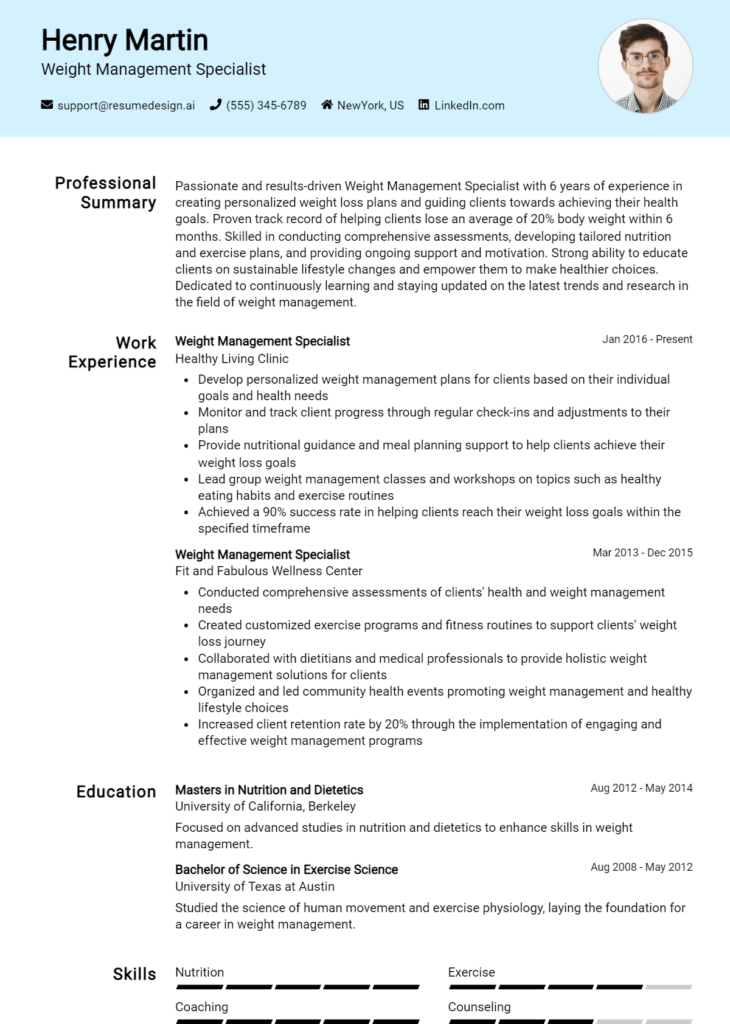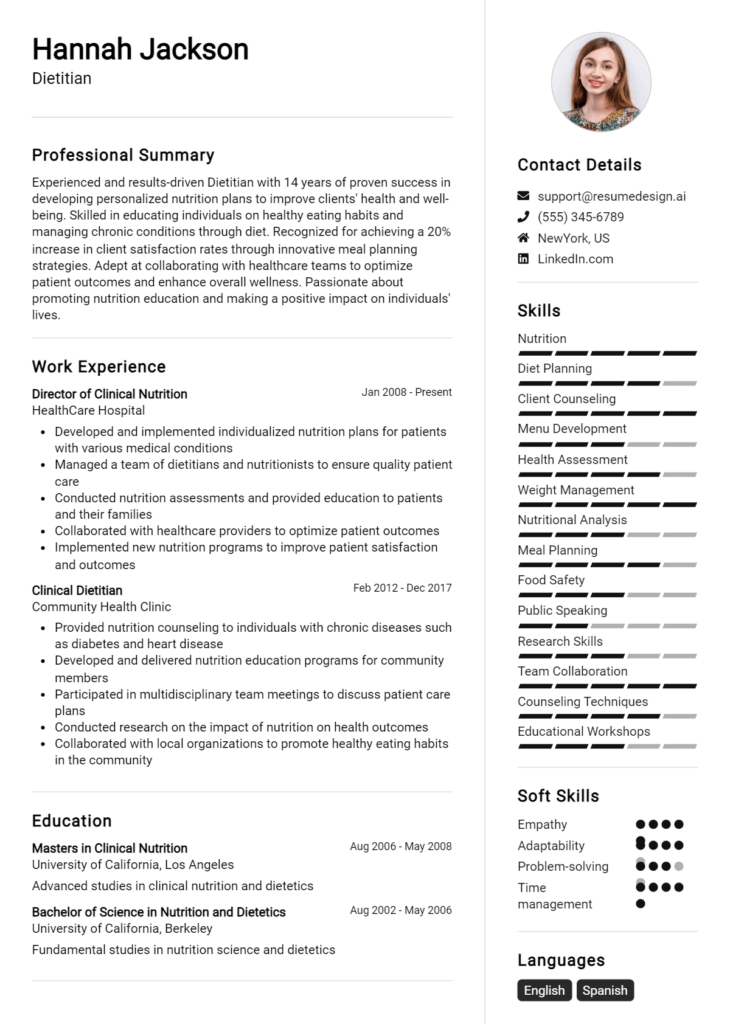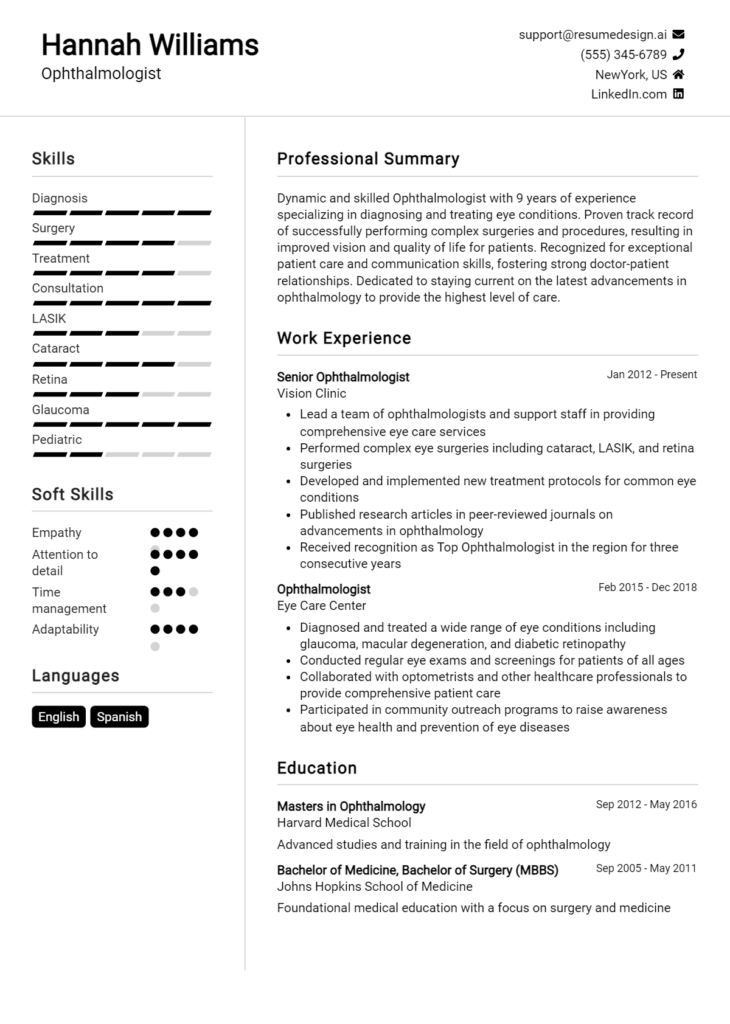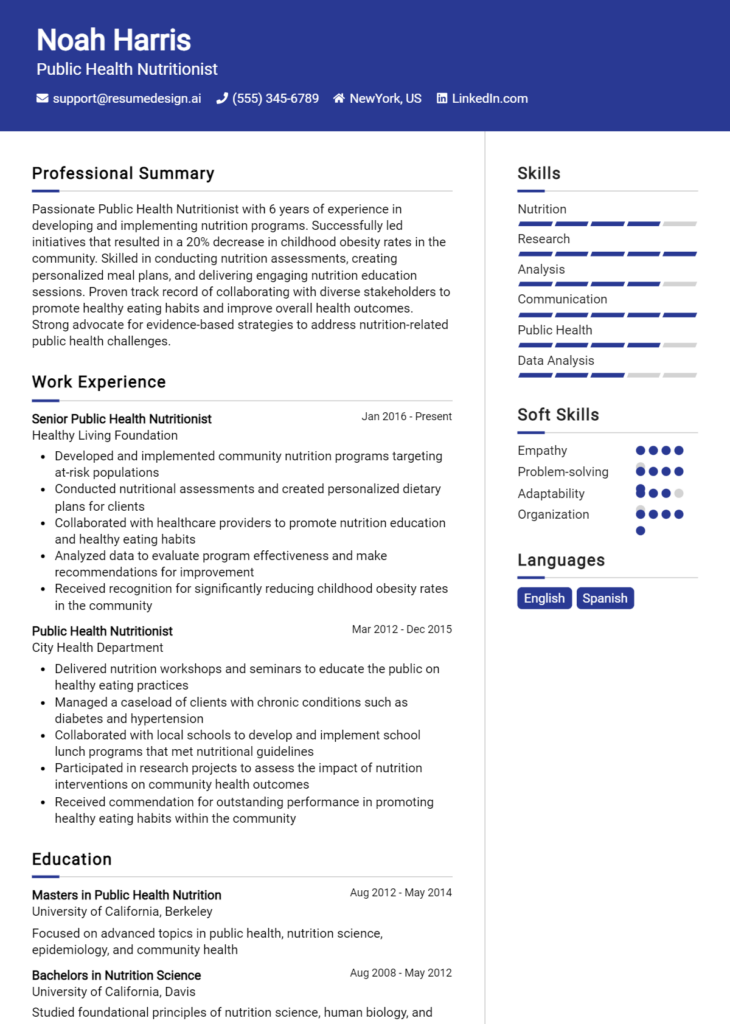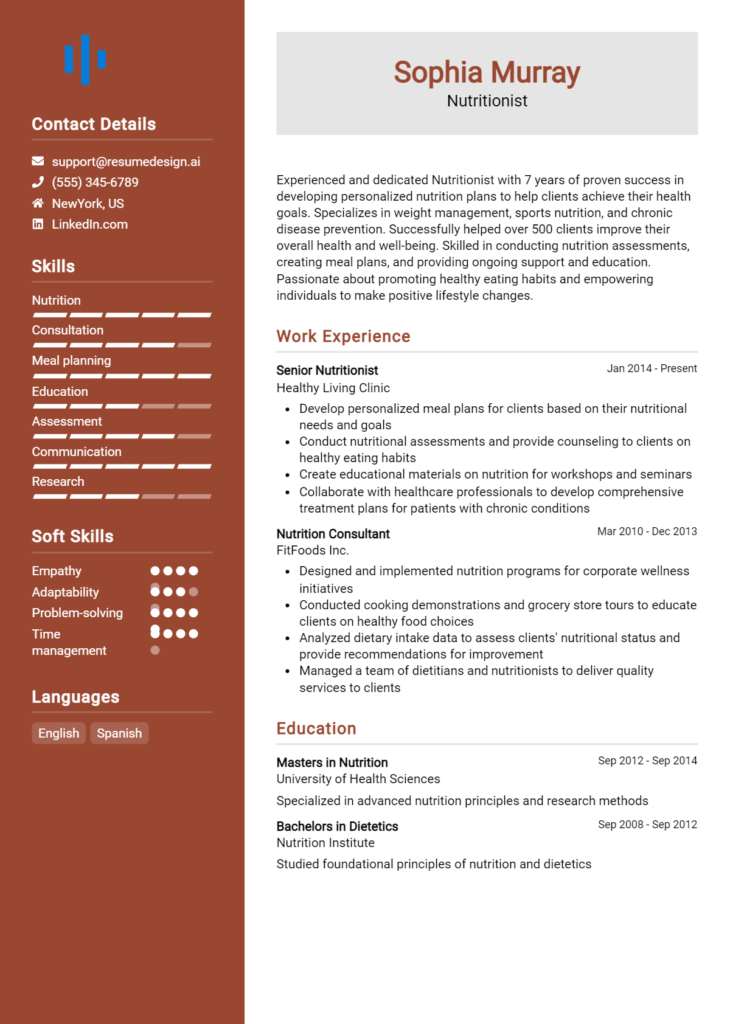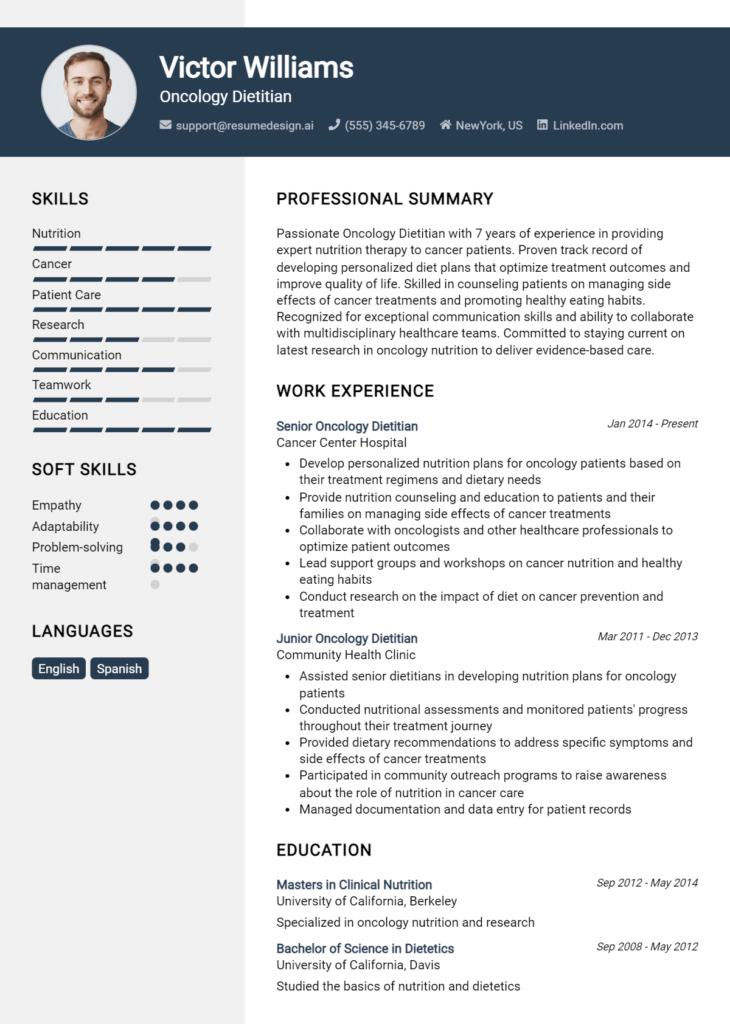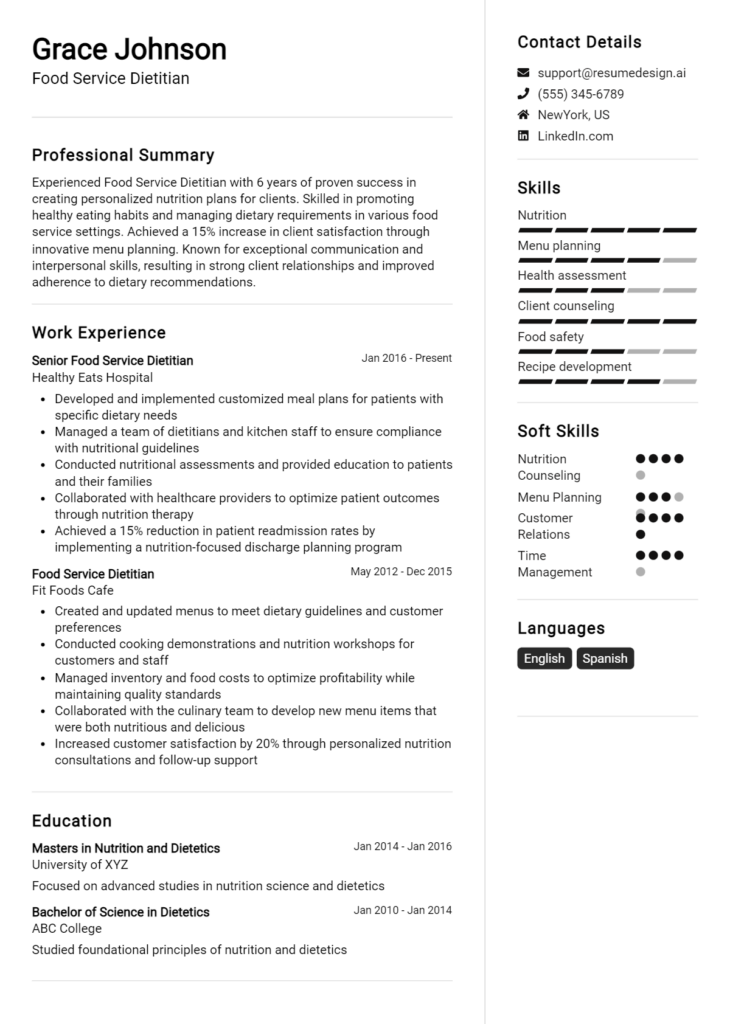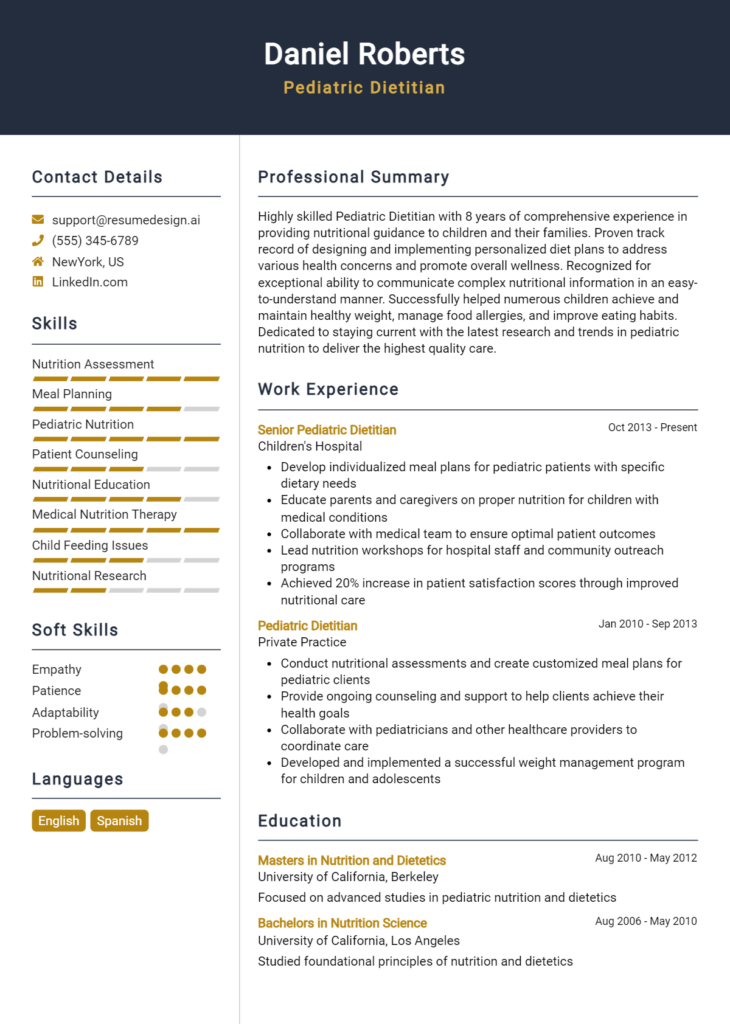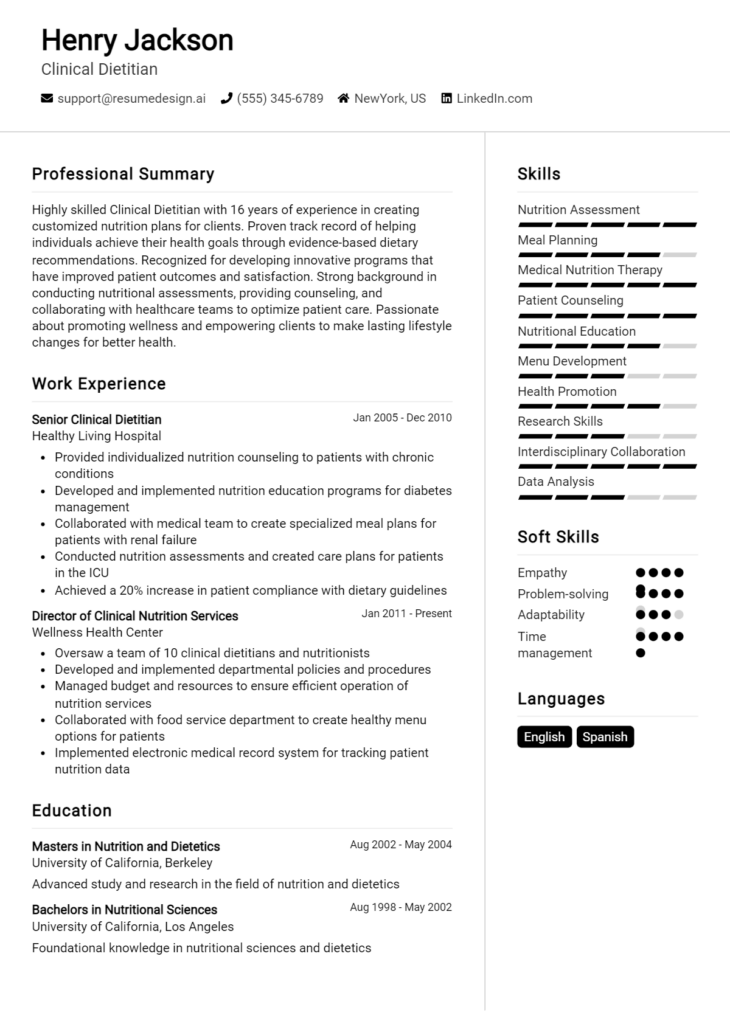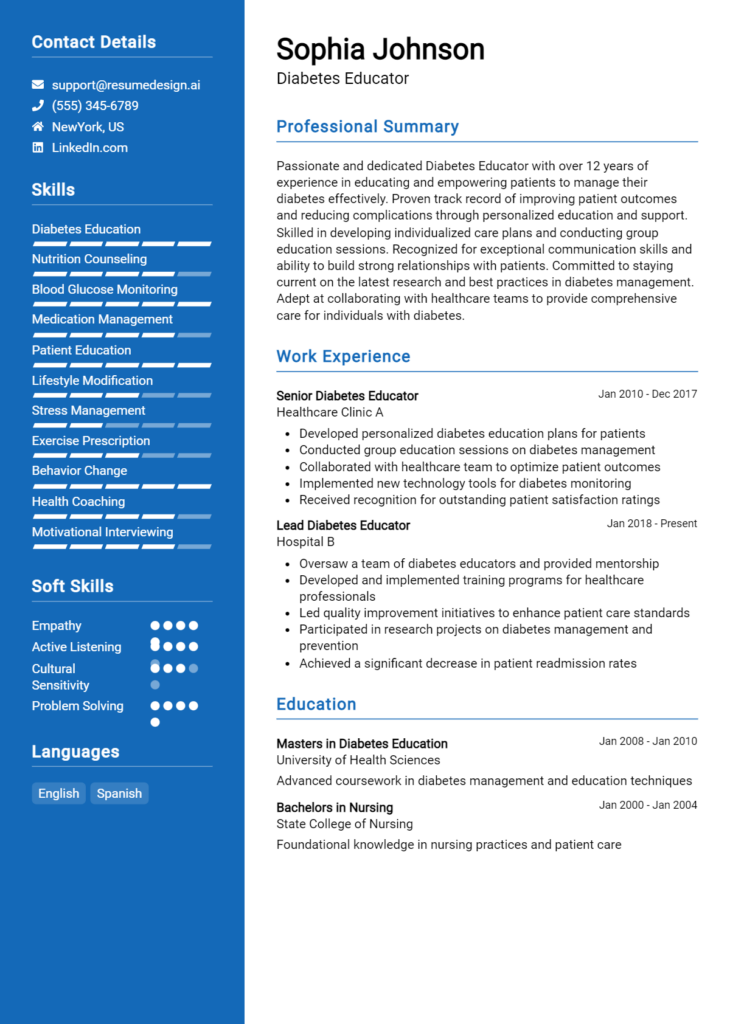Sports Dietitian Core Responsibilities
A Sports Dietitian plays a crucial role in optimizing athletic performance through tailored nutrition plans. Key responsibilities include assessing individual dietary needs, developing meal plans, and collaborating with coaches and medical staff to ensure athletes are meeting their nutritional goals. Essential skills include technical knowledge of nutrition science, operational efficiency in program delivery, and problem-solving abilities to address unique dietary challenges. A well-structured resume can effectively showcase these qualifications, emphasizing their contribution to enhancing overall organizational success.
Common Responsibilities Listed on Sports Dietitian Resume
- Conducting nutritional assessments for athletes
- Creating personalized meal and hydration plans
- Monitoring athletes' dietary adherence and progress
- Collaborating with coaches and sports medicine professionals
- Providing education on nutrition-related topics
- Conducting workshops and seminars for athletes
- Staying updated on sports nutrition research and trends
- Managing nutrition-related data and records
- Advising on supplements and ergogenic aids
- Developing nutrition policies for athletic programs
- Assessing the impact of nutrition on athletic performance
- Participating in team meetings and strategic planning
High-Level Resume Tips for Sports Dietitian Professionals
In the competitive field of sports nutrition, a well-crafted resume serves as a crucial tool for Sports Dietitian professionals seeking to make their mark. Often the first impression a potential employer has of a candidate, the resume must effectively showcase both skills and achievements to stand out in a crowded job market. A carefully tailored resume not only highlights relevant experience but also communicates the unique value a Sports Dietitian can bring to a team or organization. This guide aims to provide practical and actionable resume tips specifically designed to help Sports Dietitian professionals present their qualifications in the best light.
Top Resume Tips for Sports Dietitian Professionals
- Tailor your resume to each job description by incorporating relevant keywords and phrases that align with the specific requirements of the role.
- Highlight your educational background, including degrees in nutrition, dietetics, or related fields, and any certifications such as Registered Dietitian Nutritionist (RDN) or Board Certified Specialist in Sports Dietetics (CSSD).
- Showcase your relevant experience in sports nutrition, including internships, clinical rotations, or work with athletic teams to demonstrate your practical application of knowledge.
- Quantify your achievements by using metrics to illustrate your impact, such as percentage improvements in athlete performance or successful weight management programs.
- Include industry-specific skills such as knowledge of sports supplements, meal planning for athletes, and experience with performance nutrition strategies.
- Utilize action verbs to describe your responsibilities and accomplishments, creating a dynamic and engaging narrative of your professional journey.
- Incorporate any relevant research, presentations, or publications that underscore your expertise and thought leadership in sports nutrition.
- Keep the design clean and professional, using clear headings and bullet points for easy readability while ensuring that your resume is no more than one to two pages long.
- Include professional affiliations or memberships in organizations such as the Academy of Nutrition and Dietetics or the Sports, Cardiovascular, and Wellness Nutrition (SCAN) practice group, which can enhance your credibility.
By implementing these tips, Sports Dietitian professionals can significantly enhance their resumes, making them more appealing to potential employers. A strong resume not only highlights qualifications and achievements but also demonstrates a candidate's commitment to excellence in the field, ultimately increasing the chances of landing a job in this dynamic and rewarding profession.
Why Resume Headlines & Titles are Important for Sports Dietitian
In the competitive field of sports nutrition, a well-crafted resume headline or title can serve as a powerful first impression. For a Sports Dietitian, the headline is crucial because it succinctly encapsulates the candidate’s key qualifications and expertise in a way that immediately grabs the attention of hiring managers. A strong headline should be concise, relevant, and directly related to the job being applied for, allowing candidates to present their unique value proposition in just a few impactful words. This strategic approach not only highlights essential skills but also sets the tone for the rest of the resume, making it an indispensable element in the job application process.
Best Practices for Crafting Resume Headlines for Sports Dietitian
- Keep it concise: Aim for 5-10 words that clearly convey your expertise.
- Be role-specific: Tailor your headline to the specific position you are applying for.
- Highlight key achievements: Include notable certifications or accomplishments that set you apart.
- Use action-oriented language: Start with strong verbs to convey proactive qualities.
- Incorporate relevant keywords: Use industry-specific terms that align with the job description.
- Avoid jargon: Ensure your headline is easily understood by all hiring managers.
- Showcase your unique selling proposition: Emphasize what makes you a standout candidate.
- Stay professional: Maintain a tone that reflects your qualifications and seriousness about the role.
Example Resume Headlines for Sports Dietitian
Strong Resume Headlines
Certified Sports Dietitian with 5+ Years of Experience in Elite Athletic Nutrition
Performance-Driven Sports Nutritionist Specializing in Tailored Diet Plans for Athletes
Expert in Nutritional Strategies for Enhancing Athletic Performance and Recovery
Weak Resume Headlines
Dietitian Looking for Job
Nutrition Specialist
The strong headlines are effective because they immediately communicate the candidate's specific qualifications, experience, and focus within the realm of sports nutrition, compelling hiring managers to learn more. In contrast, the weak headlines fail to impress due to their vagueness and lack of detail; they do not convey any real value or differentiation, which can result in the candidate being overlooked amidst a sea of applicants. A compelling and targeted headline can set the stage for a successful job application by engaging potential employers right from the start.
Writing an Exceptional Sports Dietitian Resume Summary
A well-crafted resume summary is crucial for a Sports Dietitian as it serves as the first impression to hiring managers. This brief but impactful statement quickly highlights the candidate’s key skills, relevant experience, and notable accomplishments in the field of sports nutrition. A strong summary not only captures attention but also sets the tone for the rest of the resume, showcasing how the candidate is uniquely qualified for the specific position they are applying for. To maximize its effectiveness, the summary should be concise, impactful, and tailored to align with the job description, ensuring that it resonates with potential employers.
Best Practices for Writing a Sports Dietitian Resume Summary
- Quantify your achievements: Use numbers and metrics to demonstrate the impact of your work.
- Focus on relevant skills: Highlight specific skills that are directly applicable to the role of a Sports Dietitian.
- Tailor your summary: Customize the summary to match the job description and requirements of the position.
- Keep it concise: Aim for 3-5 sentences that encapsulate your professional identity and strengths.
- Use action verbs: Start sentences with strong action verbs to convey confidence and proactivity.
- Highlight unique qualifications: Mention any specialized training or certifications that set you apart.
- Showcase passion for sports nutrition: Communicate your enthusiasm for the field and commitment to helping athletes succeed.
- Avoid jargon: Use clear language that is easily understood by hiring managers without a nutrition background.
Example Sports Dietitian Resume Summaries
Strong Resume Summaries
Results-driven Sports Dietitian with over 7 years of experience in developing personalized nutrition plans for athletes, leading to a 20% improvement in performance metrics among clients. Certified Sports Nutritionist with expertise in optimizing meal timing and macro-nutrient distribution.
Dedicated Sports Dietitian skilled in creating evidence-based nutrition strategies, resulting in a 30% reduction in recovery time for professional athletes. Proven ability to collaborate with coaches and trainers to enhance overall team performance.
Passionate Sports Dietitian with a Master’s in Nutrition and a proven track record of enhancing athletic performance through tailored dietary interventions. Successfully managed nutrition programs for teams, yielding a 15% increase in overall health metrics.
Weak Resume Summaries
Experienced dietitian who works with athletes. I like helping people with their nutrition.
Nutrition expert with knowledge of diet plans. Seeking to work in a sports environment.
The strong resume summaries are effective because they provide specific examples of achievements, quantify results, and directly relate to the responsibilities of a Sports Dietitian. They use clear metrics to illustrate the candidate's impact on athlete performance and recovery. In contrast, the weak summaries lack detail and specificity, making them appear generic and less compelling. They do not demonstrate the candidate's qualifications or how they align with the job role, which diminishes their effectiveness in capturing a hiring manager's interest.
Work Experience Section for Sports Dietitian Resume
The work experience section of a Sports Dietitian resume is crucial as it serves as a direct reflection of the candidate's expertise and capability in the field. This section not only highlights the technical skills that a sports dietitian possesses but also demonstrates their ability to manage teams, collaborate effectively with athletes and coaches, and deliver high-quality nutrition plans and services. By quantifying achievements and aligning their experiences with industry standards, candidates can substantiate their qualifications and showcase their impact on athletic performance and team success.
Best Practices for Sports Dietitian Work Experience
- Highlight specific nutrition programs developed and their impacts on athlete performance.
- Quantify achievements, such as percentage improvements in athlete performance metrics or reduced injury rates.
- Showcase collaboration with coaches, trainers, and athletes to emphasize teamwork skills.
- Detail technical skills, including knowledge of dietary supplements, meal planning, and sports nutrition science.
- Include certifications and training that enhance credibility in the field.
- Use action verbs to convey a sense of proactivity and leadership.
- Tailor the experience to reflect the demands and standards of the sports nutrition industry.
- Emphasize ongoing education and participation in relevant workshops or seminars.
Example Work Experiences for Sports Dietitian
Strong Experiences
- Developed and implemented a comprehensive nutrition program that improved athlete performance by 20% over a season.
- Led a team of nutritionists in creating meal plans for a collegiate sports program, resulting in a 30% decrease in athlete injury rates.
- Collaborated with a multidisciplinary team to conduct nutrition workshops, reaching over 100 athletes and enhancing their understanding of sports nutrition.
- Managed dietary assessments and tailored nutrition interventions for over 50 elite athletes, achieving a 95% satisfaction rate in post-program evaluations.
Weak Experiences
- Worked with athletes on nutrition.
- Helped develop meal plans.
- Participated in team meetings.
- Gained experience in sports nutrition.
The examples categorized as strong experiences demonstrate clear, quantifiable outcomes and effective collaboration, showcasing the candidate's ability to lead and achieve results in a sports setting. In contrast, the weak experiences lack specificity and measurable achievements, making them less impactful and failing to convey the depth of the candidate's expertise in sports nutrition.
Education and Certifications Section for Sports Dietitian Resume
The education and certifications section of a Sports Dietitian resume is crucial in establishing the candidate's qualifications and expertise in the field. This section not only showcases the academic background necessary for understanding nutrition science and its application in sports but also highlights industry-relevant certifications that demonstrate the candidate's commitment to professional development. By including relevant coursework, specialized training, and recognized credentials, candidates can greatly enhance their credibility and show prospective employers that they are well-prepared to meet the unique dietary needs of athletes and active individuals.
Best Practices for Sports Dietitian Education and Certifications
- List degrees in nutrition, dietetics, or related fields with the institution name and graduation date.
- Include certifications such as Registered Dietitian Nutritionist (RDN) or Certified Specialist in Sports Dietetics (CSSD).
- Incorporate relevant coursework that emphasizes sports nutrition, exercise physiology, or metabolism.
- Highlight any continuing education courses or workshops that pertain to sports nutrition and health.
- Showcase any specialized training in areas such as meal planning for athletes or performance enhancement.
- Be specific about the accreditation of certifications and the relevance to the role of a sports dietitian.
- Keep the section concise yet informative, focusing on the most relevant and recent qualifications.
- Consider including membership in professional organizations related to sports nutrition.
Example Education and Certifications for Sports Dietitian
Strong Examples
- Bachelor of Science in Nutrition and Dietetics, University of Health Sciences, 2021
- Registered Dietitian Nutritionist (RDN), Commission on Dietetic Registration, 2022
- Master's Certificate in Sports Nutrition, National Academy of Sports Medicine, 2023
- Certified Specialist in Sports Dietetics (CSSD), 2022
Weak Examples
- Bachelor of Arts in English Literature, University of Generic Studies, 2015
- Certification in Basic Food Safety, 2010
- Online Course in Culinary Arts, 2018 (not nutrition-specific)
- Certification in Personal Training, 2019 (not directly related to dietetics)
The strong examples are considered relevant because they directly align with the qualifications needed for a Sports Dietitian, showcasing a solid educational foundation and recognized industry credentials. In contrast, the weak examples reflect degrees and certifications that do not pertain to sports nutrition or dietetics, which could mislead potential employers about the candidate's suitability for the role. Highlighting appropriate education and certifications is essential for establishing expertise and credibility in the competitive field of sports nutrition.
Top Skills & Keywords for Sports Dietitian Resume
In the competitive field of sports nutrition, a well-crafted resume is essential for any Sports Dietitian looking to stand out. One of the most critical components of a successful resume is the inclusion of relevant skills. These skills not only showcase your expertise but also demonstrate your ability to tailor nutrition plans that enhance athletic performance and promote overall health. A strong blend of hard and soft skills can significantly improve your chances of landing an interview, as they communicate both your technical knowledge and interpersonal abilities. By highlighting these skills effectively, you can create a compelling narrative that reflects your qualifications and passion for sports nutrition.
Top Hard & Soft Skills for Sports Dietitian
Soft Skills
- Effective communication
- Team collaboration
- Active listening
- Empathy and compassion
- Problem-solving abilities
- Adaptability and flexibility
- Critical thinking
- Motivational skills
- Time management
- Cultural competence
Hard Skills
- Knowledge of macronutrients and micronutrients
- Familiarity with dietary supplements
- Proficiency in meal planning and preparation
- Understanding of sports physiology
- Ability to conduct dietary assessments
- Experience with nutrition software and tools
- Familiarity with food safety regulations
- Skills in conducting workshops and seminars
- Research and analytical skills
- Knowledge of food labeling and nutrition guidelines
By incorporating these essential skills into your resume, alongside your relevant work experience, you can effectively position yourself as a qualified candidate ready to make a positive impact in the world of sports nutrition.
Stand Out with a Winning Sports Dietitian Cover Letter
As a dedicated and passionate Sports Dietitian with over five years of experience in providing tailored nutritional plans to athletes, I am excited about the opportunity to contribute my expertise to your esteemed organization. My background in sports nutrition, combined with a strong commitment to enhancing athletic performance through dietary practices, aligns perfectly with the mission of your team. I have a proven track record of working with diverse athletes, from amateurs to professionals, helping them achieve their performance goals by optimizing their nutrition.
In my previous role at [Previous Company Name], I successfully developed and implemented individualized nutrition programs that resulted in improved performance metrics and overall health for numerous athletes. By conducting thorough assessments and utilizing evidence-based research, I empowered my clients to make informed dietary choices that complemented their training regimens. My approach emphasizes not only the physical aspects of nutrition but also the psychological components, ensuring that athletes maintain a balanced relationship with food, which is crucial for long-term success.
I am particularly drawn to this opportunity because of [Company Name]'s commitment to innovation in sports performance and athlete well-being. I am eager to collaborate with your coaching staff and sports scientists to create integrated nutrition strategies that further enhance your athletes' capabilities. I believe that my ability to communicate complex nutritional information in an accessible manner will foster a supportive environment for athletes to thrive.
Thank you for considering my application. I am looking forward to the possibility of contributing to your team and helping athletes reach their peak performance through optimal nutrition. I am excited to discuss how my experience and passion for sports dietetics can align with the goals of [Company Name].
Common Mistakes to Avoid in a Sports Dietitian Resume
When crafting a resume as a Sports Dietitian, it’s essential to present your qualifications, experience, and passion effectively. However, many candidates make common mistakes that can hinder their chances of landing an interview. These pitfalls can range from formatting errors to a lack of specificity in their achievements. Here are some common mistakes to avoid when creating your Sports Dietitian resume:
Generic Objective Statement: Using a vague or generic objective statement fails to capture the attention of hiring managers. Tailor your objective to reflect your passion for sports nutrition and your specific career goals.
Overloading with Jargon: While industry-specific terms are important, overloading your resume with jargon can alienate readers. Ensure your language is clear and accessible to both dietitians and non-specialists.
Neglecting Soft Skills: Focusing solely on technical skills and certifications can make your resume one-dimensional. Include soft skills like communication, teamwork, and motivational abilities that are crucial in a sports environment.
Lack of Quantifiable Achievements: Simply listing job duties can make your resume less impactful. Instead, highlight quantifiable achievements, such as improvements in athlete performance or successful dietary programs you implemented.
Ignoring Formatting Consistency: Inconsistent formatting can detract from the professionalism of your resume. Use uniform fonts, bullet points, and spacing to create a polished and easy-to-read document.
Omitting Relevant Experience: Failing to include internships, volunteer work, or relevant projects can weaken your application. Showcase any hands-on experience that demonstrates your expertise in sports nutrition.
Not Tailoring for Each Job Application: Sending out a one-size-fits-all resume can lead to missed opportunities. Customize your resume for each position to highlight the most relevant skills and experiences.
Skipping Proofreading: Typos and grammatical errors can leave a poor impression on potential employers. Always proofread your resume multiple times, or have someone else review it, to ensure it’s error-free.
Conclusion
As a Sports Dietitian, your role is crucial in enhancing athletic performance through proper nutrition. You are responsible for assessing athletes' dietary needs, developing personalized meal plans, and educating them about the importance of nutrition in their training regimens. Key areas of focus include:
Understanding Nutritional Needs: Tailoring dietary recommendations based on the athlete's sport, age, gender, and training intensity is vital for optimal performance.
Hydration Strategies: Implementing effective hydration plans to maintain peak physical condition and prevent dehydration during training and competition.
Supplementation Guidance: Advising athletes on the appropriate use of supplements, ensuring they align with their dietary goals and comply with sports regulations.
Recovery Nutrition: Emphasizing the importance of post-exercise nutrition to promote recovery and muscle repair, enhancing overall performance.
Education and Support: Providing ongoing support and education to athletes, helping them understand the link between nutrition and performance, which is essential for their success.
In conclusion, as a Sports Dietitian, your expertise can make a significant difference in the lives of athletes. To ensure you present your qualifications effectively, we encourage you to review your Sports Dietitian resume. Utilize available resources such as resume templates, resume builder, resume examples, and cover letter templates to create a standout application that highlights your skills and experience. Take action today to enhance your career opportunities!

